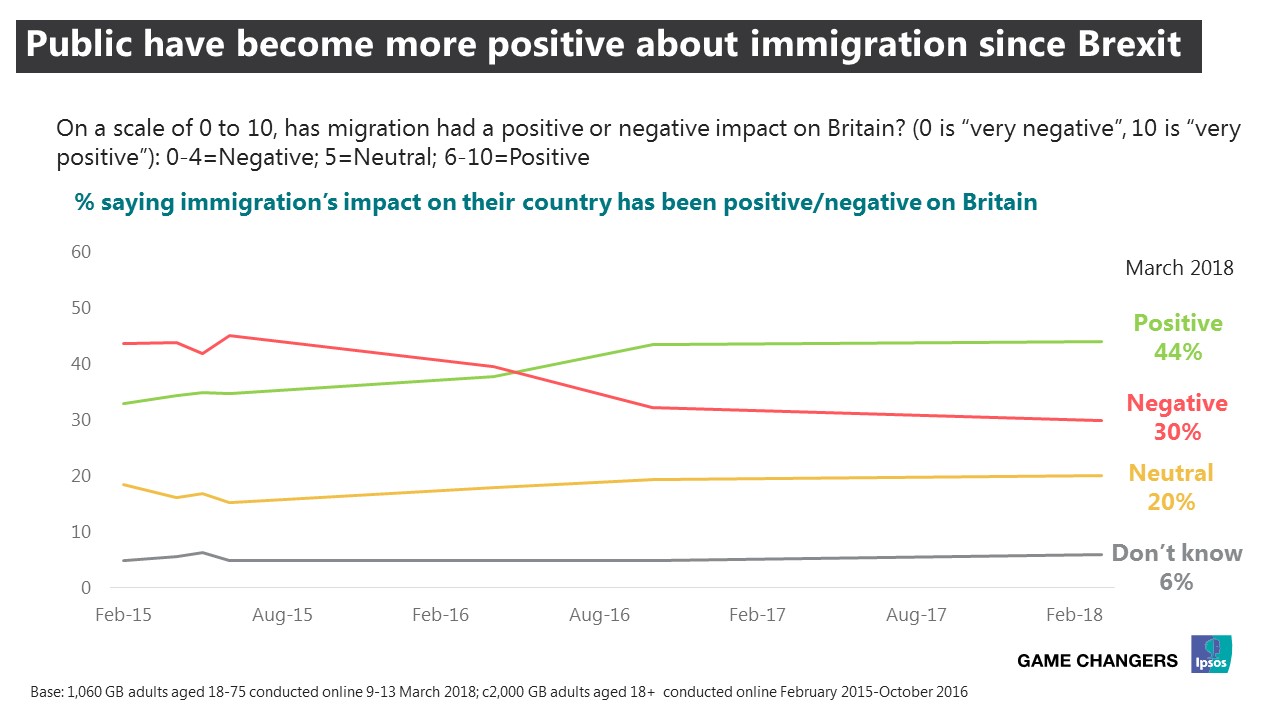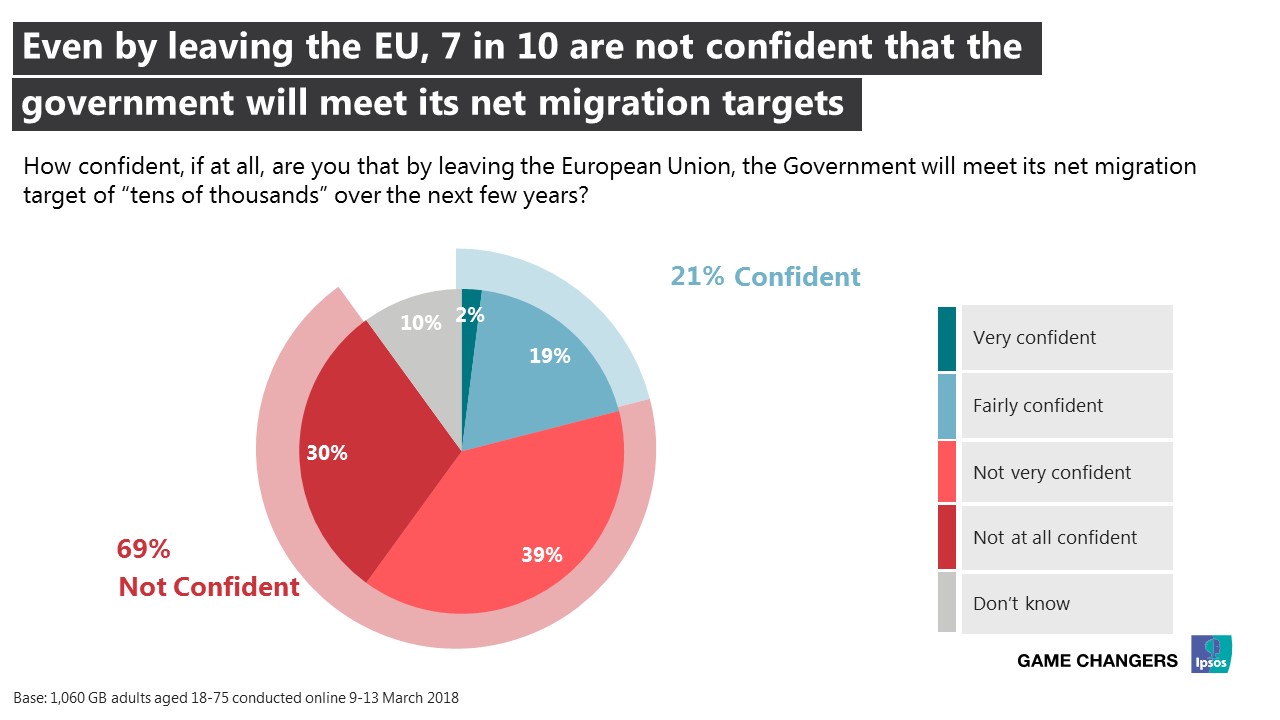Attitudes to immigration have softened since referendum but most still want to see it reduced
British attitudes to immigration have softened since the EU referendum – but most still want to see it reduced
- 44% say they are positive about immigration’s impact on Britain – higher than before the EU referendum
- But the majority of the public still wants immigration numbers reduced, even though people are beginning to notice that the number of EU immigrants has fallen since the EU referendum
- Britons think they worry about immigration more than some other European countries, they are actually less worried
- A majority are dissatisfied with the Government’s handling of immigration among both Leave and Remain voters – though views are not as negative as under Cameron’s government but seven in ten lack confidence the government will hit its “tens of thousands” immigration target by leaving the EU
Just under half (44%) say that migration has had a positive impact on Britain according to a new Ipsos survey among British adults aged 18-75. Three in ten (30%) say migration’s impact has been negative on the country while one in five (20%) say its impact has been neutral. These findings are consistent with previous research by Ipsos which found the British public’s attitudes towards migration have become more positive since the referendum.

There are differences, however, by both party support and whether people voted Leave or Remain in the EU referendum. A majority (57%) of Labour supporters say migration has had a positive impact while Conservative supporters are split on the issue: 35% say it has been positive and 39% say negative. Two-thirds (64%) of Remain voters say immigration has had a positive impact but almost half (47%) of all Leavers say immigration has had a negative impact.
Despite opinion towards immigration becoming more positive in recent years a majority (54%) still want it to be reduced. However, the proportion of people wanting immigration reduced ‘a lot’ has fallen over the last 18 months from 37% to 30%. Three-quarters (77%) of Leave voters want immigration reduced compared to 38% of Remain voters.
Other findings from the survey include:
- Although these figures suggest the opposite when asked, most Britons say their views on immigration haven’t changed since the referendum and where they have, people are more likely to think they have become more worried than less (by 21% to 13%).
- When asked if Britons are more or less positive about the impact of immigration on Britain than other Europeans are about immigration in their countries 42% say Britain is less positive while another 42% say the level of worry is about the same. Just 7% say Britons are more positive. A multinational Ipsos study from last year revealed that in actual fact Britons are more positive than many other EU countries – two in five (40%) in Britain at the time said immigration had a positive impact – well ahead of Sweden which was the second most positive country in Europe (25% said immigration had a positive impact).
- A quarter (26%) think the topic of immigration has been discussed too much in recent years while a third (32%) thinks it has been discussed too little and another third (34%) think it’s been discussed the right amount. There are notable differences by referendum vote – half (51%) of Remain voters think it has been discussed too much while half (52%) of Leave voters say it has been discussed too little.
Perceptions about the current Government and immigration
- Most (53%) are dissatisfied with the way the current Government is dealing with immigration (12% are satisfied). These findings are slightly better for Theresa May’s Government when compared to when the question was last asked in March 2015 during David Cameron’s Prime Ministership – then three in five (61%) were dissatisfied with the Government’s handling of immigration while 9% were satisfied. Satisfaction levels vary by political lines although more Conservative supporters (40%) say they are dissatisfied than satisfied (25%). Nearly two-thirds (63%) of Labour supporters are dissatisfied with the Government’s handling of immigration while there is no difference by referendum vote – 55% of Remain voters are dissatisfied as compared to 56% of Leave voters.
- Seven in ten (69%) are not confident that even by leaving the EU, that the Government will reduce net migration to the “tens of thousands” in the next few years (21% are confident). Even most supporters of the Conservative party aren’t convinced with (55%) saying they’re not confident (39% are confident) although Labour supporters are much more sceptical with 77% saying they’re not confident. When looking at the figures by EU referendum vote, more Leave voters than Remain voters are confident the government will reach its target (29% vs. 15% respectively) although a majority of both are not confident.

Perceptions of change since the EU referendum
- More people think that the number of EU immigrants coming into the UK has decreased than increased since the referendum vote (39% vs. 24% respectively)1. A quarter (25%) thinks the number of immigrants has remained the same. A majority (53%) of Remain voters think the number has decreased compared to three in ten (30%) Leave voters. When it comes to reflections on the number on the number of immigrants in people’s local area, just 9% say it has decreased since June 2016 while a quarter (24%) think it’s increased – 55% say it’s stayed the same.
- A quarter (26%) say the number of unemployed in the UK has decreased since the referendum (another 25% say increased) while 42% say the direct investment into the UK from other EU member states has decreased – just 5% say increased.
- Six in ten (59%) feel there has been no change to their own standard of living – three in ten (29%) say it has decreased and 10% say it has increased. Remain voters are more likely than Leave voters to say their standard of living has decreased (35% compared to 25%).
- A majority (56%) say the quality of the NHS has decreased since the EU referendum (4% say it’s increased). There is difference between the two main parties here with 46% of Conservatives feeling the NHS has got worse compared to two-thirds (66%) of Labour supporters while similar figures exist between Remain and Leave voters – 65% of Remain voters say the quality of the NHS has decreased compared with 49% of Leave voters.
Commenting on the findings, Kully Kaur-Ballagan, Research Director at the Ipsos Social Research Institute said:
Immigration was a key issue during the EU referendum vote and one that continues to divide Leave and Remain voters. However, Britons are slowly becoming less negative about the issue, with more people thinking that the impact of immigration has been positive rather than negative. That said, the majority of people still want to see immigration numbers reduced although opinion has softened a little here as well. This may be in part due to the fact that people are beginning to notice a fall in the number of EU migrants coming to the UK and because now that exiting the EU is underway, people feel there will be an imperative to control EU migration. However, there is still scepticism that Theresa May is handling the issue well - the majority of the public is not convinced that even by leaving the EU will the Government meet its net migration target – even the majority of Conservative supporters.
Note 1: Note the question asked has there been a change since the EU referendum, not because of the referendum result.
Technical Note
Ipsos interviewed a representative sample of 1,060 adults aged 18-75 across Great Britain. Interviews were conducted online between 9 -13 March 2018. Data are weighted to the profile of the population.



